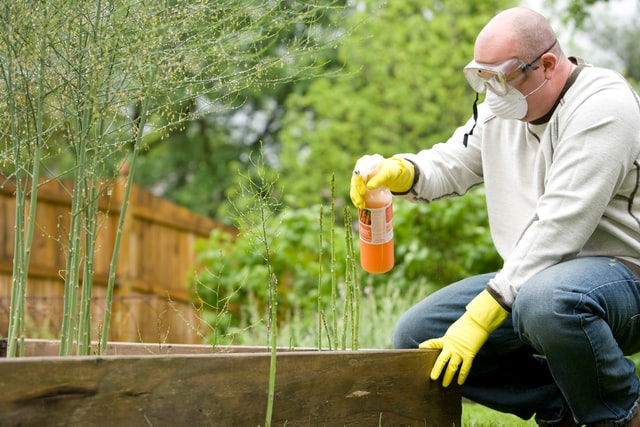
Protecting Yourself From Harmful Chemicals While Landscaping
 You may use a variety of chemicals while landscaping, including herbicides, pesticides and fungicides. While these chemicals are often necessary for the proper care and maintenance of gardens, lawns and other parcels of land, they are all inherently dangerous and need to be handled and stored safely.
You may use a variety of chemicals while landscaping, including herbicides, pesticides and fungicides. While these chemicals are often necessary for the proper care and maintenance of gardens, lawns and other parcels of land, they are all inherently dangerous and need to be handled and stored safely.
Risks When Using Chemicals
Many of the chemicals you use on the job are meant to kill living things, such as insects, plants or weeds. They are essentially poisons that can have negative effects on your health.
There are four types of exposure to harmful chemicals:
- Dermal – getting chemicals on your skin –
The most common exposure; can cause mild to severe dermatitis (skin inflammation) - Oral – swallowing chemicals –
Can damage the digestive system and enter the bloodstream, where they can quickly spread - Inhalation – breathing in chemicals –
Can lead to chemical pneumonitis (inflammation of the lungs) - Ocular – getting chemicals in your eyes –
Can lead to visual impairment or even disfigurement
While landscaping chemicals are only intended for use outdoors, residues can be carried away by wind and contaminate indoor air, dust and carpets in a home. This is especially problematic for young children and the elderly, as they are more susceptible to negative health effects from exposure to chemicals. Always remember to follow chemical application guidelines to limit exposure to chemicals.
Choose the Right PPE
The Environmental Protection Agency (EPA) mandates that all pesticide products be labeled. The label will include short-term toxicity of the product and the manufacturer’s personal protective equipment (PPE) requirements for application. For other types of chemicals, always check the label before application and follow the manufacturer’s guidelines for safe use.
There are a variety of PPE options for working with chemicals. Different types of PPE include:
Chemical-resistant materials: Prevent the movement of certain chemicals through the material to your skin for a limited period of time. No material claims to be chemical-proof. There are several different chemical-resistant material options:
- Coveralls: A one- or two-piece suit that the manufacturer specifies as resistant to certain chemicals. The suit may be made from butyl rubber, neoprene, PVC or another type of resistant fabric. Some are reusable, while others must be disposed of after use.
- Gloves: Hand coverings made from similar materials as coveralls. Generally, thicker gloves offer protection for a longer period. Remember, waterproof gloves are not necessarily chemical-resistant. Never wear cotton, leather or canvas gloves unless the chemical’s label explicitly calls for it.
- Footwear: Can be one-piece, pull-on boots made of natural rubber or coated in another chemical-resistant substance. Disposable and reusable shoe covers are available for specific chemicals. Keep contaminated footwear at work to avoid further contamination.
- Headgear: Includes hats or hoods. These are often made from the same chemical-resistant materials as coveralls, gloves and footwear.
- Apron: Generally not used for application, but may be used for mixing chemicals before application. Aprons should be coated with a chemical-resistant material before use.
Respirators: Used for heavy applications, respirators must be approved by the National Institute of Occupational Safety and Health (NIOSH). There are three types of respirators:
- Air-purifying Respirators (APRs)
- Powered Air-purifying Respirators (PAPRs)
- Supplied-air Respirators (SARs)
Again, check the label to determine which type of respirator, if necessary, should be used for the application process.
Eye protection: Includes safety glasses, face shields, chemical goggles and respirators.
Safe Storage of PPE
- PPE should never be stored inside a room with other chemicals.
- All PPE should be stored separately from personal clothing and other personal items.
- During lunchtime or breaks, used PPE must be hung up in a safe place until it is reclaimed for spraying. Do not put contaminated PPE back into a locker or anywhere where it might contaminate workplace surfaces, clean PPE or personal items.
Health Effects From Exposure to Landscaping Chemicals
According to a U.S. Government Accountability Office study, of the 30 most commonly used lawn pesticides:
- Nineteen are linked with cancer or carcinogenicity
- Thirteen are linked with birth defects
- Twenty-one with reproductive effects
- Twenty-six with liver or kidney damage
- Fifteen with neurotoxicity
- Eleven with hormonal disruption
Clearly, these chemicals are dangerous if you are exposed to them for significant periods, and that’s why choosing the right PPE for the job is so important.
Our focus is to keep you safe on the job. If you have any questions about PPE and chemical use, ask your supervisor.
This article is informational purposes only, and is not intended as medical or legal advice. © 2014-2015, 2017, 2019 Zywave, Inc. All rights reserved.
Tags: Landscaping, Safety Tips
